

Country western and rock are long since siblings, one with a twang. Such wasn't, however, always so. Country western has its origins in New York City via composers like Vernon Dalhart and Carson Robison looking west as they addressed country folk music. Folk music, into which territory country western invaded, was a conservative genre full of back-woods bluegrass and prairie gospel with small taste for such as country swing, especially not with percussion, the latter forbidden on the stage of the Grand Ole Opry for years from its founding in 1925 to 1944 when a choice arrived between Bob Wills performing with his drummer or Wills not showing up all. Despite the addition of jazzy swing, C&W remained a bastion of conservative politics and religion even as the broader bed of folk music became more liberal w Old Folk and New Folk delineated at Bob Dylan. The meld of folk with popular and rock occurred w country western as well, with the exception that C&W remains a largely conservative audience, though with a rock attitude about being distinctly C&W. Like flamenco, which is either flamenco or not, musically speaking, so is country western a style all to itself. All said, though the C&W audience now more mixes w that of rock, back in the latter's early days it wasn't so. Country western musicians who experimented w rock did so at risk to their careers as C&W artists. That climate became more divided in the sixties upon rock musicians bearing long hair instead of crew cuts. Early titles below were all recorded before 1960.
In 1947 the biggest name in honky tonk, Hank Williams Sr., issued 'Move It On Over'. Straight from the master of hillbilly music, it would also reveal that R&B wasn't the only act in town when it came to inventing what would get dubbed rock n roll seven years later by disc jockey, Alan Freed. That would create a Chinese finger trap for C&W which audience distanced itself from the liberal new genre at the same time that C&W and R&R had come to share a thing called beat that made them a lot alike, so similar that C&W has adamantly maintained its country roots via styling ever since. If something's a "thing" in rock it's a "thang" in country, for an exaggerated nonmusical example. The bridge from Williams' honky tonk to rockabilly was Carl Perkins who issued 'Blue Suede Shoes', his own composition, on 19 December 1955. Perkins had been in an outfit in Tennessee called the The Perkins Brothers Band which played mostly Williams tunes. Thereafter came versions of rockabilly by such as Elvis Presley, Bill Haley, and the later rockabilly trio formed in 1979, the Stray Cats. Williams, however, didn't live to see the rise of rockabilly, dying on 1 January 1953. There are no specifically rock artists below, sticking to country western, beginning with Williams.
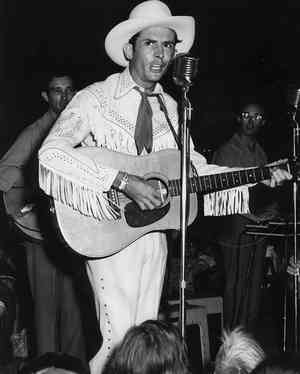
Hank Williams Sr.
Photo: The Tennessean
Source: MP3 XL
'Move It On Over' composed by Hank Williams 1947
Born in 1929 in Chapel Hill, Tennessee, jazz guitarist, Thomas Grady Martin was also a country western musician who liked to work in both genres. Performing regularly for WLAC radio in Nashville at age fifteen, several years later he joined Red Foley on 'Chattanoogie Shoe Shine Boy' [Lord's Disco] for release in January of 1950. In 1951 Martin put together a band called the Slew Foot Five and made his first recordings as a leader that year: 'Bully of the Town'. The early fifties saw sessions with such as Bing Crosby and Burl Ives, as well as recordings with his band now called the Winging Strings. During the latter fifties Martin became a Nashville A-Team session guitarist, thereat to participate in titles by such as Marty Robbins and Johnny Horton. In 1964 he contributed to jazz trombonist, Kai Winding's 'Modern Country'. Others employing his talents in '64 were Roy Orbison and Lefty Frizzell. Martin issued the LP, 'Instrumentally Yours', in 1965. 1966 found him on clarinetist, Pete Fountain's, 'Mood Indigo'. His LP, 'A Touch of Country', appeared in 1967. He appeared on Joan Baez' 'Any Day Now' in '68 and 'David's Album' in '69. In the seventies he worked with such as J J Cale, Sammi Smith, Loretta Lynn, Conway Twitty and Kris Kristofferson. 1977 saw the issue of the LP, 'Country Classics'. In 1978 Martin traded session work for the road to tour with Jerry Reed. He's also said to have joined Willie Nelson's band that year, with which he worked until retirement in 1994 for health reasons. In the meantime he'd supported the jazz group, the Four Freshmen, on 'Graduation Day' in 1982, then shifted back to country the next year on Merle Haggard's 'That's the Way Love Goes'. Martin died of heart attack on December 3, 2001, in Lewisburg, Tennessee, leaving a legacy of nearly 400 sessions. Grady Martin country. Grady Martin jazz.
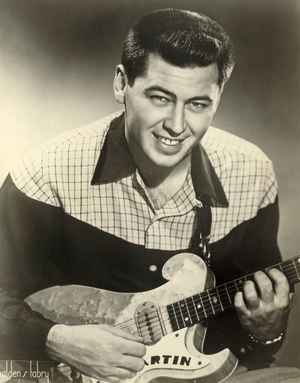
Grady Martin
Source: From the Vaults
'Chattanooga Shoe Shine Boy' Grady Martin backing Red Foley 1950
Composition: Jack Stapp-Harry Stone
'When My Dream Boat Comes Home' Grady Martin & the Slew Foot Five Decca 9-30022 1954
Composition: Cliff Friend-Dave Franklin
Hillbilly pianist, Moon Mullican, had been born on 29 March of 1909. First recording in 1936, Mullican liked to align country western with blues, boogie woogie and rock n roll. He released his 'Rheumatism Boogie' on King 965 AA in 1951 [Discogs]. 'Seven Nights to Rock' rolled around in 1956 on King 45-4894 [Discogs]. Mullican lived long enough to witness the British Invasion, but died relatively young on 1 January 1967.
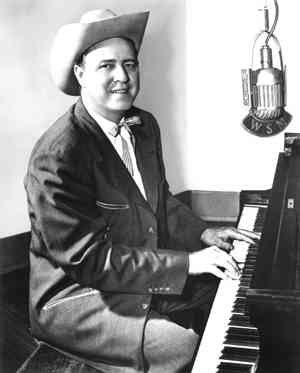
Moon Mullican
Source: F.U.N.K.
'Rheumatism Boogie' composed by Mullican & Louis Innis King 965 AA 1951
'Seven Nights to Rock' King 45-4894 1956
Composition: Buck Trail-Henry Glover-Louis Innis
Marty Robbins was born in Glendale, Arizona, in 1925 to play both guitar and piano. He taught himself guitar while serving in the Navy in the Solomon Islands during World War II. Upon discharge he began performing gigs in Phoenix, quickly acquiring his own radio show on KTYL, then just as quickly acquired his own television show on KPHO. When Little Jimmy Dickens appeared as a guest on the latter he assisted Robbins in gaining his debut recording contract in 1951 toward the March 1952 release of 'Love Me Or Leave Me Alone' w 'Tomorrow You'll Be Gone' on Columbia 20925 and the June 1952 issue of 'Crying 'Cause I Love You' w 'I Wish Somebody Loved Me' on Columbia 20965 [Rocky Productions]. Robbins' 'I'll Go on Alone' rose to Country's #1 tier in 1952, followed by fifteen more to 'El Paso City' in 1972 [Music VF]. He released his first LP in 1955, shared with Carl Smith and Lefty Frizzell, called 'carl, lefty and marty'. Robbins issued 'Rock'n Roll'n Robbins' the next year, 'The Song of Robbins' and 'Song of the Islands' in 1957, and the eponymously titled 'Marty Robbins' in 1958. He was inducted into the Country Music Hall of Fame in 1982. Robbins was also a race car driver, competing in 35 NASCAR races, finishing in the top ten six times. His last race was in 1982 a month before his death upon heart attack on December 8 that year. Though Robbins authored the majority of his recordings, those below were composed by others.
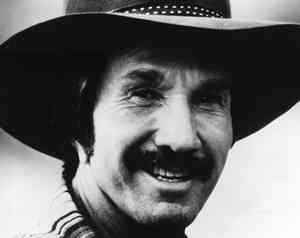
Marty Robbins
Source: VK
'That's All Right' Marty Robbins 1954
Composition: Arthur Crudup
'Maybellene' Marty Robbins 1955 Composition: Chuck Berry
Born in North Carolina in 1937, George Hamilton IV was a student at the University of North Carolina when he released his first records in 1956: 'Sam'/'I've Got a Secret' (Colonial CR-410) and 'If You Don't Know'/'A Rose and a Baby Ruth' (Colonial CR-420/ABC Paramount 9765). Though Hamilton began his career in rock he soon moved over to C&W upon becoming a member of the Grand Ole Opry in Feb of 1960. His most popular LPs were 'Steel Rail Blues' issued in 1966 and 'Folk Country Classics' in 1967. His most recently released albums were in 2011: 'In the Heart of Texas' and 'A Tribute to Luke the Drifter (The Other Side of Hank Williams)' before his death on September 17, 2014, in Nashville.
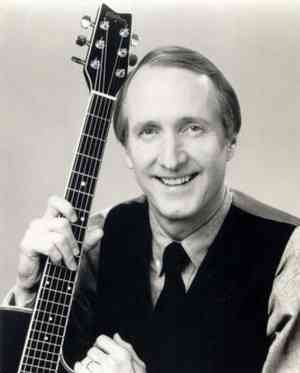
George Hamilton IV
Source: Metro Lyrics
'A Rose and a Baby Ruth' George Hamilton IV 1956
Composition: John Loudermilk
The Tennessee Ramblers based in North Carolina had nothing to do with either Tennessee nor the bluegrass group by the same name also called the Sievers Ramblers. The Tennessee Ramblers were among the first country swing bands, having been formed in 1928 by mandolin player, Dick Hartman. They first performed on tour to various radio stations like Pittsburg's KDKA. First recording in 1935, they also performed in films with Gene Autry and Tex Ritter. Upon Hartman's departure in 1938 the group was led by fiddler, Jack Gillette, who may have been in on their first recordings. Banjo and steel guitar player, Cecil Campbell assumed the reigns in 1946, having been with the group since 1932-33. Cecil led the group into the early seventies. It was Cecil's band which issued the rockabilly 'Rock and Roll Fever' on MGM K12482 on 30 May 1957 [45Cat].
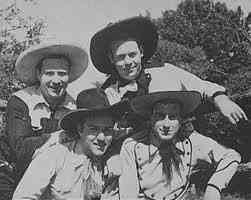
Tennessee Ramblers
Source: Hillbilly Music
'Rock and Roll Fever' Tennessee Ramblers 1957
Composition: Cecil Campbell-William Lear
Mickey Gilley was born in Natchez, Mississippi, on 3 March 1936. He began his career as a boogie woogie pianist. Indeed, as a child he played piano with cousin, Jerry Lee Lewis, as well as Jimmy Swaggart who played piano as a youth before later becoming a Pentecostal pastor. Among other country musicians who began their careers in rock were Conway Twitty (rockabilly) and Kenny Rogers (R&B). Gilley's first issues were 'Tell Me Why'/'Ooh Wee Baby' on Minor MH 106 in 1957 and 'Call Me Shorty'/'Come On Baby' on Dot 15706 in 1958 [45Cat].
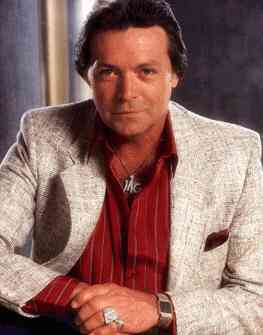
Mickey Gilley
Source: Bands In Town
'Tell Me Why' Composed by Mickey Gilley Minor MH-106 A Issued Oct 1957
'Ooh Wee Baby' Mickey Gilley Minor MH-106 B Issued Oct 1957
Composition: M. Ross
Though born in Ohio on 15 July 1913, Cowboy Copas (Lloyd Estel) was bred on country western and would be an esteemed member of the Grand Ole Opry. In 1958 he recorded a rockin' square dance titled 'Circle Rock' composed by Herb Alpert and Lou Adler. Some of the best dancing I've ever seen has been in country western bars. Copus died not yet fifty years old in Camden, Tennessee, on 5 March 1963.
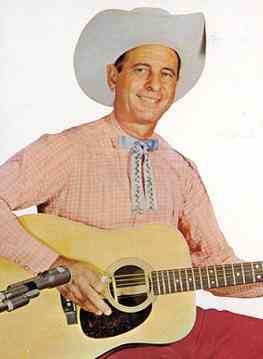
Lloyd Cowboy Copas
Source: The Pogues
'Circle Rock' Lloyd Cowboy Copas Dot 45-15735 Issued March 1958
Composition: Lou Adler-Herb Alpert
It was sometime in 1958 that Roy Clark issued 'Please Mr. Mayor' backed by 'Puddin' in the UK on Master's Voice 45-POP 581 [Discogs]. Clark was a banjo, guitar and mandolin virtuoso born in Virginia in 1933. He made his first appearance at the Grand Ole Opry at age seventeen. His first unissued recordings were w Marvin Rainwater's Rockin' Tommyhawks in 1953, hanging with Rainwater's ensembles into 1956. In the meantime he issued his first name titles, 'Mysteries of Life' backed by 'Sugar Coated', on 4 Star 45-1659 in 1954. Clark released the first of above fifty albums, 'The Lightning Fingers of Roy Clark', in 1962. Clark and Buck Owens became hosts of the television show, 'Hee Haw', in 1969. Owens continued for seventeen years, Clark above twenty. Owens also issued a little rock. He had composed 'Hot Dog' w Denny Dedmon toward issue in 1957 under the pseudonym, Corky Jones. Owens later covered Chuck Berry's 'Johnny B. Goode' in 1969. After years of partnering w Owens, Clark finally became a member of the Grand Ole Opry in 1987. He was inducted into the Country Music Hall of Fame in 2009 before dying on November 15, 2018.
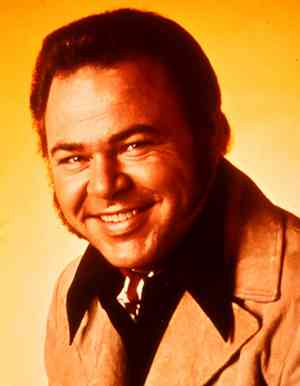
Roy Clark
Source:
Ranch Party Round Up
'Please Mr. Mayor' Roy Clark His Master's Voice 45-POP 581 A 1958
Composition: Augustus Bobby Stevenson
'Puddin'' Roy Clark His Master's Voice 45-POP 581 B 1958
Composition: Augustus Bobby Stevenson-Blackwell
Webb Pierce was born on 8 August 1921 in West Monroe, Louisiana. His first issues arrived in 1949: 'Heebie Jeebie Blues' w 'Sweetheart I Love You So' (4 Star 1357), 'English Sweetheart' w 'High Geared Daddy' (4 Star 1413) and 'Million Years From Now' w 'I Heard Her Call My Name In Prayer' (4 Star 1401), the last with Betty Pierce. Webb topped the Billboard Country charts thirteen times from 'Wondering' in 1951 to 'Honky Tonk Song' in 1957. He topped the Cashbox charts twice, first for 'I Ain't Never' in 1959, followed by 'Memory No.1' in 1964. Pierce issued 29 albums from 'Webb Pierce' in 1955 to 'In the Jailhouse Now' in 1982 w Willie Nelson. He died not a decade later on 24 Feb of 1991.
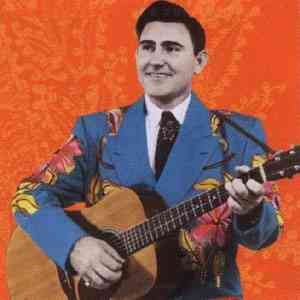
Webb
Pierce
Source:
Martin Vintage Guitars
'I Ain't Never' Composed by Mel Tillis w Webb Pierce 1959
Such was some of the rock issued by C&W artists during the first decade of rock n roll when country was for country and rock was for kids in concrete jungles, seeming steadier overall to keep things that way. Besides, where are you going to give your horse a brushing down before some oats in New York City?
Sources & References:
Further Reading:
Grand Ole Opry:
Rockabilly Music:
Classical Main Menu Modern Recording
hmrproject (at) aol (dot) com